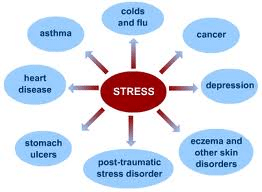Does your boss (or husband) make you tense up just by walking in the room?

‘At first, she seemed nice, if a bit highly strung, but I put it down to new job nerves,’ says Julie, 38, from Wimbledon, UK.
‘But as the weeks went on it became clear that she was the kind of person who got stressed by anything and everything. When she’s upset, which is frequently, she mutters and curses loudly under her breath. It’s really distracting, but if you offer to help she gets defensive.
‘I am naturally an easy-going person and get on well with everyone, but being around her is hard. I feel myself physically tensing up. I find it difficult to concentrate with her mumbling next to me and so I become stressed because I’m falling behind, whereas I was always on top of my work before.
‘It’s got to the stage where I leave work feeling almost as uptight as she does and dread going in the next day. My colleagues feel the same. She speaks to them aggressively and nobody can relax because we’re always waiting for her to turn on us.
‘It’s like her stress has spread throughout the whole office. She walks into the room and infects the place in five minutes flat.’
So could Julie’s boss’s stress be ‘infectious’? Studies seems to support this theory — claiming stress can be as contagious as the common cold and you can actually ‘catch’ other people’s anxieties.
So if you are sitting next to a moaning colleague who goes into meltdown about the slightest thing, or spends the day whining, it could leave you with more than a bent ear — it could give you ‘second-hand stress’.
Psychologist Professor Elaine Hatfield says ‘passive’ or second-hand stress can quickly spread around the workplace.
‘We can catch other people’s anxiety, depression or stress. Whatever they’re feeling, we feel the same way,’ says Professor Hatfield.
Her study found that, like sponges, we soak up other people’s emotions — be it good or bad — something called ‘emotional contagion’.
In part, we take on our colleague’s stress in an attempt to identify with them. But then the misery poured into our ears starts to have a real effect and causes us to dwell on our own troubles more than we usually would.
As well as absorbing other people’s feelings we can sub-consciously mimic stressed body language — hunching shoulders or furrowing our brows when talking to them.
‘I have to remind myself to put my shoulders down,’ says Julie. ‘By the end of the day they’re up by my ears. The situation feels like it’s out of control. I can’t manage her stress for her and she’s my boss, so I’m scared to talk to her about it.’
‘I’m now worrying about work in a way that I never did before and it’s spilling into my home life. I dread going into the office, I don’t sleep well and am more anxious than I ever used to be.’
Julie’s case is far from unique. Stress has emerged as the most common reason for workers to be signed off on long-term sick leave — ahead of stroke, heart attack, cancer and back problems.
Stress has become so widespread, says Dr Andrew Parker, a consultant psychiatrist at Capio Nightingale Hospital in Marylebone, London, that his hospital is opening a specific stress and post-traumatic stress disorder clinic.
‘The atmosphere in some offices is really down at the moment as a result of redundancies and greater work load, and it’s affecting people,’ says Dr Parker.
‘I see a lot of professionals with stress-related conditions, many at senior levels. They might have difficulty going to sleep or they’re waking up at 3am, feeling unrefreshed. Perhaps they suffer low motivation or struggle to get work done; maybe they procrastinate or are unable to make decisions.’
While stress often has tangible causes — the threat of redundancies, heightened work-loads, poor sales — it can also be exacerbated just by being around other stressed people, he says.
‘Other people’s stress inevitably affects us all. We’re designed to notice the emotional states of others — it’s part of natural empathy. Body language, expression, tone of voice and what someone’s saying are all indicators of stress. It happens automatically, but some people will pick up other people’s feelings more keenly than others.’
Indeed, according to Professor Hatfield, women are much more likely to ‘catch’ stress. ‘Women are more at risk because they tend to be more in tune with other people’s feelings,’ she explains.
And it’s not just in the office — we can just as easily pick up the worries of friends. We might even feel stressed hearing about the latest financial crash or natural disaster on the news. In fact, one friend of mine — Pat — has not watched the news in more than a year.
‘I was constantly hearing about job losses, stock market crashes or natural disasters and I was getting increasingly anxious. My job hadn’t changed and my house wasn’t being swept away in a flood, but I almost felt like it could happen at any time. I’d wake up in the middle of the night convinced I was going to lose my job. So I decided to stop listening to any more bad news on the TV or radio,’ she says.
‘It’s made a huge difference. I really believe that worrying is contagious and we can all bring each other down if we’re not careful.’
Even Dr Parker has taken a similar step: ‘I stopped listening to Radio 4 a long time ago. Tuning in to John Humphrys delivering bad news in the morning was not a good start to the day.’
And there are lots of little things like this you can do to make yourself less likely to ‘catch’ stress, says Dr Parker.

First of all, he says, separate other people’s stress from your own.
‘If you are with somebody who is stressed, acknowledge the situation, but don’t react impulsively. Take a mental step back, breathe and try to create a mindset that stops you absorbing their stress,’ he says.
‘Often it helps to physically step away from the situation — get a cup of tea, look out of the window or walk around the block. I encourage people to take these “micro-breaks” throughout the day.’
But surely we should be trying to help our friends and colleagues when they are stressed and overwhelmed?
Only up to a point, says Professor Cary Cooper, an expert on workplace stress, from Lancaster University.
‘We should try to help colleagues or friends who are struggling,’ says Professor Cooper. ‘But very often people just like to vent their feelings without ever solving their problems. And you should walk away from them because they will infect you with their negativity.’
And what should we be doing if it seems like the whole office are losing their heads, not just one moaning soul in the corner?
‘All too often offices have a culture in which you feel you need to appear to be stressed in order to look like you’re busy — the result is everyone running around frantically when it’s unnecessary. Don’t be dragged into this way of working.
‘If colleagues are having a moan, either walk away or say something positive about the situation — often things aren’t as bad if we keep them in perspective.
‘Positivity can be infectious, too. Point out the good things going on at work. Talk about personal things — what you’re doing at the weekend, for example.’
Good advice — but what is there to do if it’s you who is spreading the stress?
Last year I bumped into a colleague from my first job after college. It was a sales role in recruitment that I was poorly suited to and I was in a permanent state of anxiety.
‘I was so stressed I used to have to keep going for walks around the pond behind the office,’ I said to my former colleague.
‘I remember being around you was so stressful I wanted to jump into that pond!’ she joked. Except she wasn’t really joking. Her comments stung because I knew they were true. It dawned on me that my stress affects other people.
‘A bit of self-awareness and good communication is what’s needed,’ says Dr Parker. ‘Let people know you are under pressure and let them help you. That way, instead of being something nasty that spreads like a virus, stress can be turned into force for good.’


